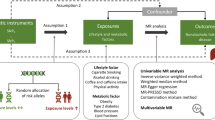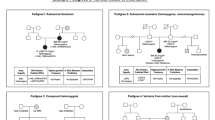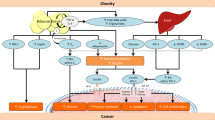Abstract
A recent genome-wide association study showed that the rs9939609 polymorphism in the fat mass and obesity-associated (FTO) gene was associated with body mass index (BMI)/obesity in Europeans. Subsequently, several studies have investigated the association between FTO polymorphism and cancer risk. However, the results have been inconsistent. In this study, a meta-analysis was performed to clarify the association between FTO polymorphism and cancer risk. Published literature from PubMed and Embase databases were retrieved. Pooled odds ratio (OR) with 95 % confidence interval (CI) was calculated using fixed-effects model. A total of 13 studies involving 16,277 cases and 31,153 controls were identified. The results suggested that FTO rs9939609 polymorphism was not significantly associated with the increased risk of cancer (OR = 1.01, 95 %CI 0.98–1.04), with the exception that a statistically significant association was found for pancreatic cancer (OR = 1.10, 95 %CI 1.03–1.19). No publication bias was detected (Begg’s test: P = 0.760; Egger’s test: P = 0.553). Our meta-analysis indicated that there was no association between FTO rs9939609 polymorphism and the increased risk of cancer, although this polymorphism was marginally associated with pancreatic cancer. However, the conclusion should be made with caution since most included studies did not take BMI/obesity into account.




Similar content being viewed by others
References
Wang D, Zheng W, Wang SM, Wang JB, Wei WQ, Liang H, et al. Estimation of cancer incidence and mortality attributable to overweight, obesity, and physical inactivity in China. Nutr Cancer. 2012;64:48–56.
Frayling TM, Timpson NJ, Weedon MN, Zeggini E, Freathy RM, Lindgren CM, et al. A common variant in the FTO gene is associated with body mass index and predisposes to childhood and adult obesity. Science. 2007;316:889–94.
Xi B. Mi J.FTO polymorphisms are associated with obesity but not with diabetes in East Asian populations: a meta-analysis. Biomed Environ Sci. 2009;22:449–57.
Adeyemo A, Chen G, Zhou J, Shriner D, Doumatey A, Huang H, et al. FTO genetic variation and association with obesity in West Africans and African Americans. Diabetes. 2010;59:1549–54.
Wang H, Dong S, Xu H, Qian J, Yang J. Genetic variants in FTO associated with metabolic syndrome: a meta- and gene-based analysis. Mol Biol Rep. 2011. doi:10.1007/s11033-011-1377-y.
Cecil JE, Tavendale R, Watt P, Hetherington MM, Palmer CN. An obesity-associated FTO gene variant and increased energy intake in children. N Engl J Med. 2008;359:2558–66.
Kaklamani V, Yi N, Sadim M, Siziopikou K, Zhang K, Xu Y, et al. The role of the fat mass and obesity associated gene (FTO) in breast cancer risk. BMC Med Genet. 2011;12:52.
Kusinska R, Górniak P, Pastorczak A, Fendler W, Potemski P, Mlynarski W, et al. Influence of genomic variation in FTO at 16q12.2, MC4R at 18q22 and NRXN3 at 14q31 genes on breast cancer risk. Mol Biol Rep. 2012;39:2915–9.
Lurie G, Gaudet MM, Spurdle AB, Carney ME, Wilkens LR, Yang HP, et al. The obesity-associated polymorphisms FTO rs9939609 and MC4R rs17782313 and endometrial cancer risk in non-Hispanic White women. PLoS One. 2011;6:e16756.
Delahanty RJ, Beeghly-Fadiel A, Xiang YB, Long J, Cai Q, Wen W, et al. Association of obesity-related genetic variants with endometrial cancer risk: a report from the Shanghai Endometrial Cancer Genetics Study. Am J Epidemiol. 2011;174:1115–26.
Gaudet MM, Yang HP, Bosquet JG, Healey CS, Ahmed S, Dunning AM, et al. No association between FTO or HHEX and endometrial cancer risk. Cancer Epidemiol Biomarkers Prev. 2010;19:2106–9.
Tang H, Dong X, Hassan M, Abbruzzese JL, Li D. Body mass index and obesity- and diabetes-associated genotypes and risk for pancreatic cancer. Cancer Epidemiol Biomarkers Prev. 2011;20:779–92.
Pierce BL, Austin MA, Ahsan H. Association study of type 2 diabetes genetic susceptibility variants and risk of pancreatic cancer: an analysis of PanScan-I data. Cancer Causes Control. 2011;22:877–83.
Meyer TE, Boerwinkle E, Morrison AC, Volcik KA, Sanderson M, Coker AL, et al. Diabetes genes and prostate cancer in the atherosclerosis risk in communities study. Cancer Epidemiol Biomarkers Prev. 2010;19:558–65.
Lewis SJ, Murad A, Chen L. Davey Smith G, Donovan J, Palmer T, et al. Associations between an obesity related genetic variant (FTO rs9939609) and prostate cancer risk. PLoS One. 2010;5:e13485.
Tarabra E, Actis GC, Fadda M, De Paolis P, Comandone A, Coda R, et al. The obesity gene and colorectal cancer risk: a population study in Northern Italy. Eur J Intern Med. 2012;23:65–9.
Brennan P, McKay J, Moore L, Zaridze D, Mukeria A, Szeszenia-Dabrowska N, et al. Obesity and cancer: Mendelian randomization approach utilizing the FTO genotype. Int J Epidemiol. 2009;38:971–5.
DerSimonian R, Laird N. Meta-analysis in clinical trials. Control Clin Trials. 1986;7:177–88.
Mantel N, Haenszel W. Statistical aspects of the analysis of data from retrospective studies of disease. J Natl Cancer Inst. 1959;22:719–48.
Begg CB, Mazumdar M. Operating characteristics of a rank correlation test for publication bias. Biometrics. 1994;50:1088–101.
Egger M, Davey Smith G, Schneider M, Minder C. Bias in meta-analysis detected by a simple, graphical test. BMJ. 1997;315:629–34.
Nock NL, Plummer SJ, Thompson CL, Casey G, Li L. FTO polymorphisms are associated with adult body mass index (BMI) and colorectal adenomas in African-Americans. Carcinogenesis. 2011;32:748–56.
Fischer J, Koch L, Emmerling C, Vierkotten J, Peters T, Brüning JC, et al. Inactivation of the FTO gene protects from obesity. Nature. 2009;458:894–8.
Zimmermann E, Kring SI, Berentzen TL, Holst C, Pers TH, Hansen T, et al. Fatness-associated FTO gene variant increases mortality independent of fatness—in cohorts of Danish men. PLoS One. 2009;4:e4428.
Stratigopoulos G, Padilla SL, LeDuc CA, Watson E, Hattersley AT, McCarthy MI, et al. Regulation of Fto/Ftm gene expression in mice and humans. Am J Physiol Regul Integr Comp Physiol. 2008;294:R1185–96.
Jowett JB, Curran JE, Johnson MP, Carless MA, Göring HH, Dyer TD, et al. Genetic variation at the FTO locus influences RBL2 gene expression. Diabetes. 2010;59:726–32.
Conflicts of interest
None
Author information
Authors and Affiliations
Corresponding author
Rights and permissions
About this article
Cite this article
Li, G., Chen, Q., Wang, L. et al. Association between FTO gene polymorphism and cancer risk: evidence from 16,277 cases and 31,153 controls. Tumor Biol. 33, 1237–1243 (2012). https://doi.org/10.1007/s13277-012-0372-9
Received:
Accepted:
Published:
Issue Date:
DOI: https://doi.org/10.1007/s13277-012-0372-9




